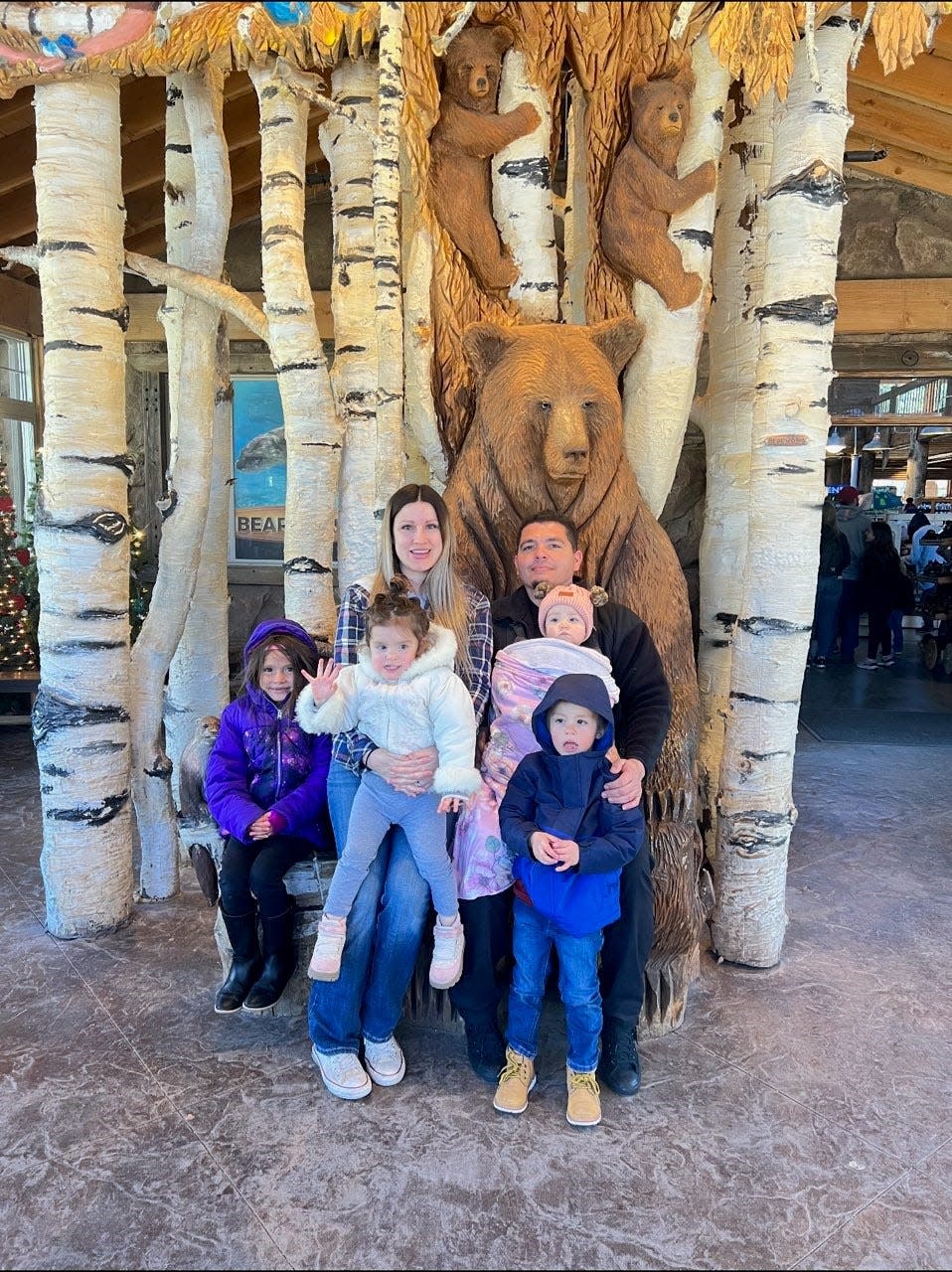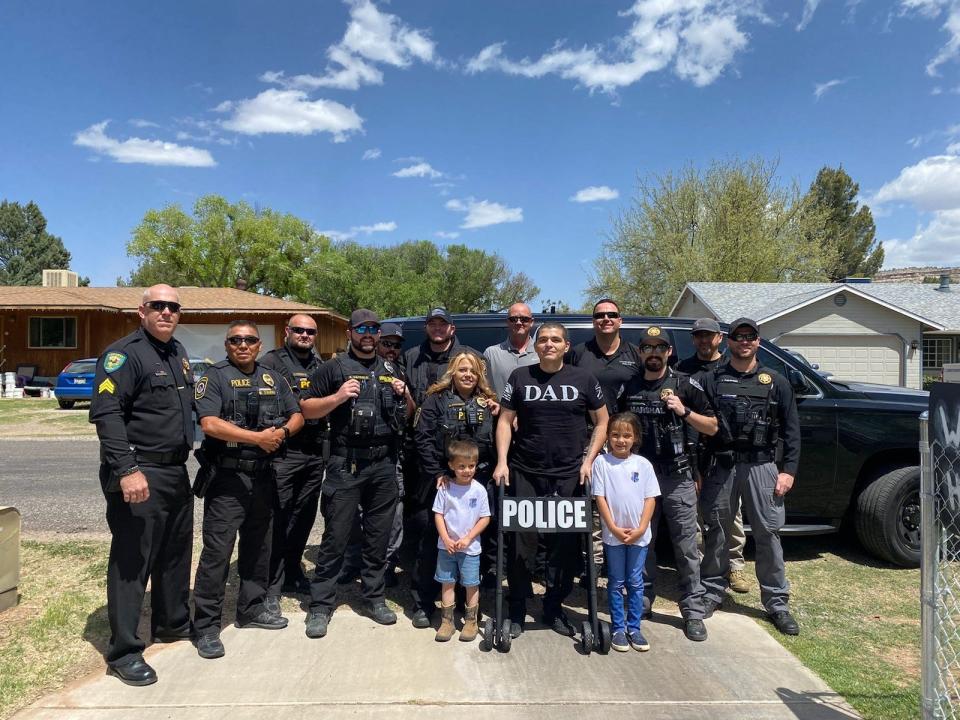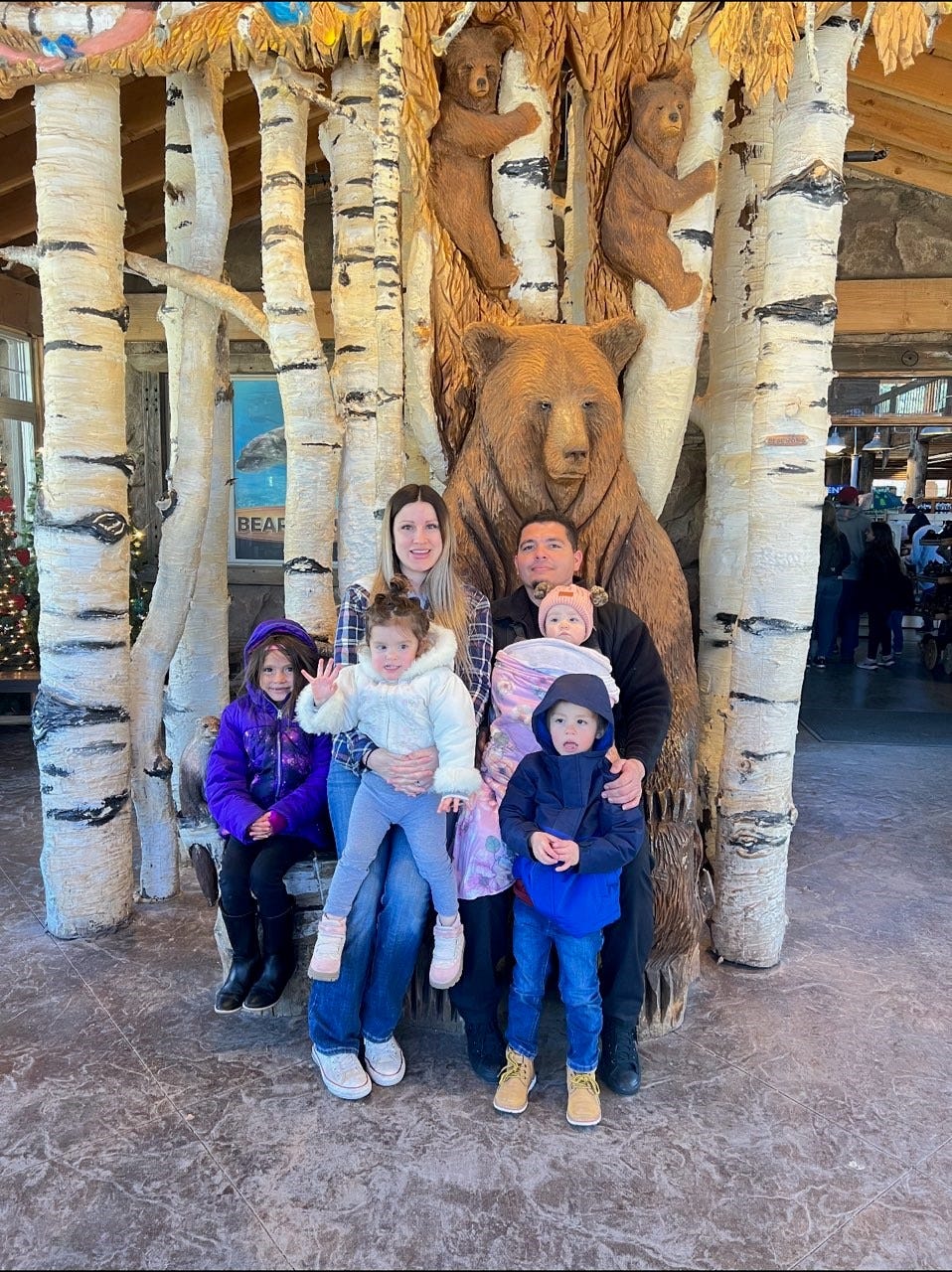The Yavapai Apache police sergeant responded to a call for help near Camp Verde on Feb. 9, 2022, where he encountered a man, later identified as 39-year-old Valentin Rodriguez, who was armed with an SKS rifle and fired twice at Brogdon.
Brogdon felt a sharp, searing pain as a bullet tore through his lower torso — below the bulletproof vest that would have otherwise left him with a painful bruise.
Brogdon returned fire as he fought through the pain, with at least one of the rounds finding purchase in Rodriguez’s hand. Rodriguez’s body would later be discovered in the Verde River, though the cause of death was unclear.
After Rodriguez fled, Brogdon rolled onto his back as he screamed in pain.
He was bleeding internally. His EMT training and experience as a Marine told him he had a short window to receive medical aid or he would be dead.
Brogdon tried standing up but the throbbing pain roared back in protest.
Another officer standing near Preston reported over the radio that Brogdon had been hit and urged Brogdon to come with him to the hospital. Preston eventually got to his feet and hobbled toward the police car as the other officer gasped words of encouragement.
Body-camera footage shows Brogdon collapsing to the ground several times as he shutters from the pain before eventually making it to the patrol vehicle.
Sitting in the backseat of the car, Brogdon told the officer to divert from their route to the hospital and instead go to a nearby fire station that had recently opened. From there Brogdon was flown to HonorHealth Deer Valley Medical Center in Phoenix.
He recalled how much nicer it was compared to the military helicopters he rode in.
‘It looks like a grenade went off inside your body’
By the time he arrived at the hospital, Brogdon had lost seven pints of blood and was put into a medically induced coma for six days.
After three surgeries—one of which gave him an infection that nearly killed him a second time—Brogdon had stabilized.
Surgeons learned the .762 millimeter bullet had shattered Brogdon’s hip and pelvis, struck part of his small intestine and liver, broke his femur and caused extensive damage to the nerves and muscles in his right leg, he said.
Two years later and Brogdon still hasn’t returned to active duty, nor will he ever.
The infection forced him to wait a year before receiving hip replacement surgery, during which time his muscles and ligaments had atrophied.
“Since my pelvis and my hip were shattered into so many pieces, they’ll never be stable enough to reattach anything to them,” Brogdon told The Arizona Republic. “I have muscle nerves that are just detached, nerves that are dead. The surgeon who worked on my hip replacement said ‘it looks like a grenade went off inside your body’ and he would question any surgeon that would try to tell me if they could fix me.”
Despite years of rigorous physical therapy, Brogdon struggles to lift his right leg higher than half of a soda can. Routine tasks such as weeding in the backyard now leave him gasping for air after 40 minutes. He has to use a walker to move around and is considered a fall risk.
And while the pain was great, Brogdon took solace that his department would honor the sacrifice he made. He believed he and his family would be taken care of.
Brogdon survives gunshot but career does not
That solace vanished in February, roughly two years after the shooting that crippled him, when Brogdon was told he was being terminated.
Brogdon said he initially received a letter from the department stating he had resigned but was eventually able to receive a termination letter from HR with the help of some colleagues.
It’s not uncommon for officers to have their employment end after suffering an injury that prohibits them from performing the duties expected of them in law enforcement.
What is uncommon, however, is for an officer to be terminated before they can medically retire, allowing them to be paid a portion of their salary for the rest of their life along with medical insurance. His employment having already been terminated, Brogdon was no longer eligible to receive the benefits officers injured in the line of duty are normally entitled to.
Rather than chasing down suspected criminals, Brogdon is chasing down answers as to how he’s going to feed his wife and five children—one of whom is only seven months old.
Paul Sheldon, president of the Arizona Fraternal Order of Police, said terminating an officer injured on the job before offering them medical retirement was unconscionable.
“That’s the part to me that’s offensive,” Sheldon said. “That doesn’t make any sense. If they’ve known for a while that he wasn’t going to be able to return to police officer duties, where was the assistance? To get a hero who’s injured in the line of duty, that could have lost his life, where are we helping him versus going ‘Not our problem.’”
Sheldon said he’s never seen a case like Brogdon’s and that, if he were an officer at the Yavapai-Apache Police Department, he would be applying to other apartments or quit on the spot after seeing the way Brogdon was treated.

“Why would I want to go out on the street one more time?” Sheldon asked.
Sheldon said that Arizona’s worker’s compensation law allows employers to terminate employees who aren’t able to return to their normal duties, but it’s the standard protocol in virtually all law enforcement agencies to work with injured officers through the medical retirement process. Brogdon’s case is unique since he was terminated by a tribal law enforcement agency, Sheldon said.
Sheldon said his organization is working on finding an attorney for Brogdon who is experienced in tribal labor law.
Yavapai-Apache Nation Chairwoman Tanya Lewis declined to comment on Brogdon’s termination or provide a reason why he wasn’t offered medical retirement.
“The Yavapai-Apache Nation is not able to comment on employment and workers compensation matters involving current or former employees as such matters are strictly confidential,” Lewis said in a written statement.
Brogdon himself remains incredulous that he’s been forced to fight for his livelihood, which could be merely a third of what he’d receive with medical retirement.
“It’s not the public’s job to compensate me,” Brogdon said. “It’s my employer and the people I’ve protected. I served my country — I didn’t do it for the money. I got out as an E4 making $21,000 a year. I didn’t do two deployments for the money.”
Brogdon’s medical benefits are also in jeopardy, and he could face the costs for the ongoing treatment that would normally be covered under medical retirement.
The termination stung in ways separate from finances.
“I didn’t even get to retire with the dignity of a police officer,” Brogdon said. “I didn’t get to sign off on the radio when people are medically retired or just retired. I didn’t even get my badge retired to me. I had to turn in everything and that was it.”
Adjusting to the new normal
Brogdon is no longer able to enjoy many of the hobbies he used to have that would relieve the stress of raising his children and fighting for his livelihood. The lasting pain makes carpentry and knife-making a pipe dream.
Even entertaining his children’s requests to play with them is a challenge.
“I was the parent on the block that had the 100-foot slip and slide and everybody would come to the house and I would get on the slip and slide with them,” Brogdon said. “Now, I haven’t tried to touch a hammer to try to make a knife. I haven’t really tried to do vehicle mechanics. I was outside for like 40 minutes trying to pull weeds and I almost passed out so I had to come inside and I was in pain for two days after that.”
While some of his kids are too young to fully comprehend what happened to their father, Brogdon said his older children are still scarred by their father’s brush with death.


“My 6-year-old and my 8-year-old, they remember every detail,” Brogdon said. “My oldest cries all the time, prays all the time for me, wishes this never happened to me. Every single one of my kids when we pray at night, they all pray that my leg gets fixed. So as a family, we still need a lot of healing and it’s going to be continuous for a really long time.”
But despite the pain and agony he’s endured, Brogdon said he doesn’t regret his decision to enter a field where being shot at was a very real possibility.
“I’ll never discourage anybody from joining the military or being a police officer,” Brogdon said. “We need the people that are called to do it. If you have the drive to do it, do it. I don’t regret doing it at all. It gave me purpose.”
Reach the reporter Perry Vandell at 602-444-2474 or perry.vandell@gannett.com. Follow him on X, formerly known as Twitter @PerryVandell.
This article originally appeared on Arizona Republic: Arizona officer was let go after gunshot injuries kept him from work
